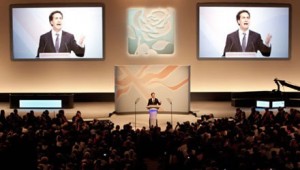Though merger with the Labour Representation Committee was agreed at the Labour Briefing AGM, ugly accusations have followed. Stan Keable of Labour Party Marxists reports

Peter Firmin’s motion to the July 7 Labour Briefing annual general meeting – that Briefing should “become the magazine of the LRC” – was carried, and the alternative motion moved by Jenny Fisher that the magazine should continue to be “run by our readers” was defeated, by 44 votes to 37 with three abstentions, after what comrade Firmin described as “by and large a healthy debate”. By this slim majority, the AGM agreed to “transfer Briefing to the LRC with immediate effect, with the aim of a relaunch at this autumn’s Labour Party conference”.
On the day, the AGM debate was thankfully free of the silly online accusation that the whole purpose of the merger proposal was personal: to exclude Jenny Fisher, Christine Shawcroft and others from Briefing’s editorial board (EB). In fact the June LRC national committee meeting had already agreed (subject to Briefing voting for the merger) to invite all existing EB members to sit on the interim editorial board “with full rights, including voting”, alongside those appointed by the NC. Subsequently, they will have the same right as anyone else to a seat on the EB – six to be elected by the LRC AGM (probably in December), and six by the national committee, to give “a balance of independence from, and accountability to, the NC”. Cooptees will not have a vote, in order “to maintain the supremacy of those elected”. It goes without saying, of course, that this NC plan may be varied by the LRC AGM itself.
This democratic structure will, hopefully, bring transparency and accountability to the editorial board, in place of the present ‘tyranny of structurelessness’ which leaves control in the hands of those in the know, or the most tenacious volunteers. “At present,” said the successful resolution, “Briefing is run by a small group of people … its structures and procedures are not very transparent and accountable.” And in the discussion on the two motions, Andrew Berry pointed to the “accountability deficit in Briefing”. Norette Moore – who, as a recent secretary of Greater London LRC, might reasonably be expected to know – said she had not previously attended a Briefing AGM because this was “the first time I heard that it is open”. I myself was similarly surprised, a few months ago, to discover that AGMs were open to readers, and that anyone at all could attend and vote. A fact not advertised, and presumably unknown to most of the roughly 950 Briefing readers.
Under these circumstances, it is perhaps inevitable that personal frictions arise and working together may become intolerable to the individuals concerned – in this case between comrades Jenny Fisher and Graham Bash. It was comrade Bash’s withdrawal from the EB in February, also withdrawing the use of his home as the EB’s office and meeting place, which triggered the revival of the 2008 proposal that Briefing should merge with LRC. But behind personal conflict there are usually political differences, and it was wrong for comrade Shawcroft to ask readers to oppose the merger on the basis of personal loyalty, as she did online, dividing the two EB camps into “carvers and carvees”.
Despite the much proclaimed commitment on both sides of the merger debate to continuing Briefing’s pluralist tradition of carrying articles from different political trends, it is evident that airing differences in public – actually a most healthy thing to do – is regarded by most as an embarrassment. In the online debates prior to the AGM, quite a few comrades bemoaned “wasting time on internal disputes”, while there are real issues “out there”. At the AGM, Simon Clark (for example), while arguing for the merger, said that the LRC “needs a paper, not debate”, and an ex-Islington councillor thought it “sad to dispute amongst ourselves”. But unless ideas are openly expressed and thrashed out in the light of day, they fester in an undeveloped form in the dark, and only burst into public view in the rotten form of a crisis – as on this occasion.
During the four years since the merger proposal was previously raised, the idea was not developed and thrashed out in the pages of the journal itself – the logical thing to have done. If that had happened, readers could have become familiar with the arguments and the issue need not have exploded onto a surprised readership in the form of a personality clash. In the period leading to the AGM, Briefing did not even carry the text of Peter Firmin’s merger motion, though it was submitted to the April EB meeting. Pre-AGM discussion in the journal was limited to a single page for each side in the June issue, and again in the July issue, but there were no readers’ letters on the merger proposal. So the main debate raged on the Facebook pages of Briefing and LRC, where facts and arguments were gradually dragged into the light – but only for those with the time and tenacity to dredge their way through hundreds of messages.
‘Historic’ delay
Chairing the AGM, comrade Shawcroft, drawing attention to the day’s agenda, announced somewhat casually and unconvincingly that the merger proposal (or “takeover”, as she called it) made this “a historic meeting”. Nevertheless, the proposed agenda allocated only an hour and twenty minutes out of four hours to this issue – to be preceded by two hours for four guest speakers and discussion. A comrade from Labour Party Marxists proposed that the “historic” merger proposal – “the reason there is such a big turnout today” – be taken seriously and moved to the top of the agenda. Only if time permitted should we hear the guest speakers. But comrade Shawcroft overruled the proposal, and invited the comrade to challenge the chair’s ruling, which would require a two-thirds majority. However, John Stewart asked if more time could be given to the two motions, and the chair agreed to start the item 30 minutes earlier.
Although passions were sometimes high, significant political differences between the two sides were difficult to discern. Both sides were clearly committed to the struggle within the Labour Party, but at least some of the anti-merger wing wanted to keep a certain distance from the LRC – because they want to keep a certain distance from the non-Labour left. The anti-merger comrades did not dispute the description of Briefing in comrade Firmin’s four-page motion: “Briefing has a unique role in providing a broad, non-sectarian voice for the left, which orientates politically towards the Labour Party and fights to channel the demands of the broader movement and campaigns towards the party and a Labour government.” But the motion also emphasised the importance of the class struggle outside the Labour Party and, while comrade Firmin said “the Labour Party is the agency of change”, he added that “class struggle is the agency of change in the Labour Party”. Richard Price, in contrast, exhibited a severe case of Labour Party sectarianism, fulminating against LRC joint secretary Andrew Fisher for resigning from Labour like so many comrades (though he later rejoined), over the Labour government’s 2003 invasion of Iraq. And the LRC, he complained, had split the Grass Roots Centre Left slate and allowed Luke Akehurst onto Labour’s NEC. So there are those who consider the LRC ultra left, eg, comrade Stewart, who penned the anti-merger page in the June issue of Briefing, admitted that “the LRC is too left for me”.
Ian Ilett, speaking in favour of the merger, saw the political difference as either “working in the Labour Party, waiting for the class struggle to come in” (anti-merger), or “going out to the class struggle” (pro-merger). Indeed, comrade Jenny Fisher’s emphasis, in moving the anti-merger motion, saw Briefing’s role almost purely within the Labour Party. “Some in the LRC,” she said, “want to build the LRC as an alternative movement.” Briefing “isn’t an organisation: it’s a magazine”. And, pretending that Briefing does not have its own politics, she added: “Don’t tell the Labour left the answers – they have ideas themselves.” Briefing should “give space to the newly elected left on Labour’s NEC and national policy forum”. Its role should be “to make the left visible, not to lead it”.
With all their talk of pluralism, of giving a voice to all strands of the Labour left, the anti-merger wing of Briefing seems satisfied with the left being divided, so that Briefing can carry on its “non-aligned” role of supposedly being everyone’s voice. These comrades do not want organisational unity – which, however, is vital to the task of defeating the pro-capitalist bureaucracy and transforming the party into a pro-working class, socialist party. Reflecting the sad division of much of the left, in or out of Labour, into bureaucratic-centralist sects which forbid public discussion of political differences, they support this backwardness by believing that pluralist organisation, where minorities can express their views, is impossible. Pluralism versus organisation.
Hence, the pejorative term, “house journal”, that was used by a number of anti-merger comrades. Comrade Fisher clearly expressed this view in a Facebook posting: “I still don’t see how the LRC can produce a pluralist and open magazine if it is the magazine of only one organisation – its mouthpiece, aiming to build that organisation (unless one assumes that organisation is the pluralist left, rather than part of it).”
Perhaps the trump card of the anti-merger wing was veteran Labour CND comrade Walter Wolfgang, who told us that Briefing is needed because “Tribune is not always consistent”. But Briefing “must be independent of an organisation … To make it a house journal would be to murder it.” However, the pro-merger trump was John McDonnell, who, after pleading for everyone to accept whatever decision was made and leave the room as comrades, reluctantly admitted that he had been won away from his previous agnostic position by the arguments of Mike Phipps and was now convinced that merger was “beneficial for the movement overall”.
Red-baiting
On July 8, the day after the AGM, instead of accepting the democratic decision of the Briefing AGM, comrades Fisher and Shawcroft issued a press release which, unfortunately, reverted to many of the acrimonious terms and arguments used online before the relatively cordial debate at the AGM. Labour Briefing is to “close down” and the LRC intends to launch “its own house journal, using the same name”. Despite the majority vote by the Briefing AGM on a motion from members of the Briefing editorial board, the press release has it that “members of the LRC – aided by members of the Communist Party of Great Britain, which produces the Weekly Worker – attended the AGM of Labour Briefing and forced through a vote …” The merger is “a hostile takeover which is tantamount to political asset-stripping”, the press release continues. “Those readers who have been robbed of their magazine are now the human collateral damage in the LRC’s turn to empire building.”
This red-baiting and fingering comrades as Communist Party members, reminiscent of McCarthyism and the worst aspects of the Labour Party in the cold war period, is repeated uncritically by Jon Lansman in his July 9 Left Futures blog, where he presents what appears to be a neutral, journalistic report – failing to mention that he was one of the signatories of the anti-merger motion, or the unmissable fact that comrade McDonnell spoke in favour of the merger.
I have as yet received no reply from comrades Fisher and Shawcroft to my two questions, asked in the light of their hostile press release: Are you planning to launch a rival magazine, as some have suggested? I hope not. Will you write for the coming issues of Briefing? I hope so.



